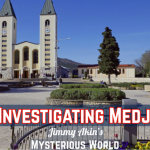
 Jimmy Akin's Mysterious World
Jimmy Akin's Mysterious World Investigating Medjugorje
Nov 22, 2024
Exploring the mysterious visions of the Virgin Mary in Medjugorje, the discussion highlights both supporting and critical viewpoints on their authenticity. Key topics include the moral integrity of the visionaries, psychological explanations for mystical experiences, and the need for skepticism in evaluating supernatural claims. The controversial messages attributed to Our Lady raise questions about their validity and the underlying motivations of the visionaries. Throughout, a balance of theological insights and critical analysis invites a deeper understanding of this complex phenomenon.
AI Snips
Chapters
Books
Transcript
Episode notes
Akin's Neutral Stance
- Jimmy Akin approached Medjugorje neutrally, emphasizing the controversy surrounding it.
- He consulted diverse sources, including supporters like Wayne Weibel and critics, focusing on verifiable facts.
Miravali's Flawed Criteria
- Mark Miravali's criteria for authentic apparitions differ from the Church's.
- He omits negative criteria and misrepresents positive ones, potentially favoring his pro-Medjugorje stance.
Irrelevant Episcopal Support
- The number of bishops visiting or supporting Medjugorje isn't relevant for proving supernaturality.
- These claims are cherry-picked data and don't align with the Church's official criteria.









 The Vatican has said that nothing obstructs the faithful from having a devotion to Medjugorje, but hasn’t specified whether the phenomenon is of supernatural or natural origin. Jimmy Akin and Dom Bettinelli examine the arguments for and against and come to their own conclusions.
The Vatican has said that nothing obstructs the faithful from having a devotion to Medjugorje, but hasn’t specified whether the phenomenon is of supernatural or natural origin. Jimmy Akin and Dom Bettinelli examine the arguments for and against and come to their own conclusions.